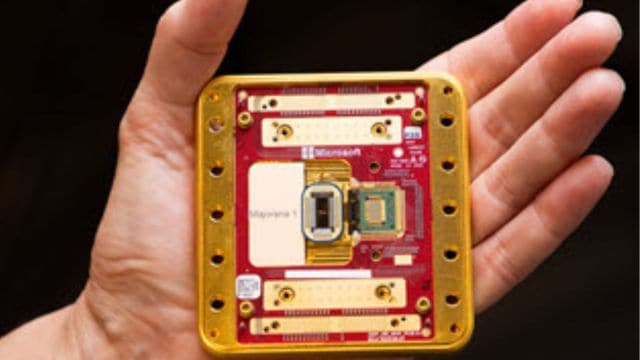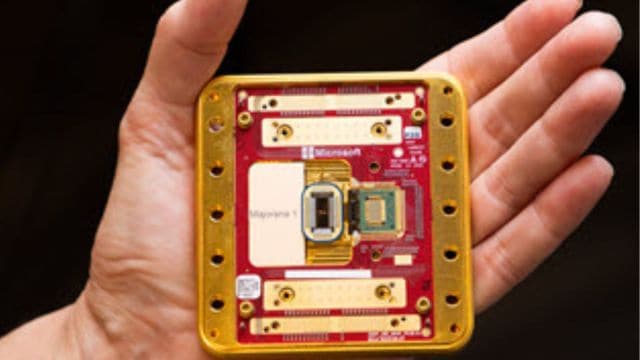Microsoft’s Quantum Computing Breakthrough: Real Deal or Overhyped?
Quantum computers are often touted as the next big thing, promising to revolutionize fields from healthcare to protecting data. Scientists are excited about the possibility of new discoveries, and businesses see a chance to become more efficient. Governments also have concerns about these powerful computers being used in cyber warfare, as they could potentially break codes and decrypt information.
While quantum computers exist today, they aren’t quite ready for everyday use. Recently Microsoft announced the development of a new quantum computing chip called Majorana 1, which has caused quite a stir.

Microsoft is calling Majorana 1 a major step forward, primarily because it’s engineered using a new state of matter. Satya Nadella, Microsoft’s CEO, suggested a timeline between 2027 and 2029 for solving complex, industrial-scale problems using this technology. The chip uses a unique Topological Core architecture which may allow it to be scaled up to a million qubits. However, experts have offered mixed reactions to the claims.
Jay Sau, a physics professor at the University of Maryland, sees Majorana 1 as a real achievement. He states that it “shows evidence for a significant level of coherence from a topological qubit.”
But, Eli Levenson-Falk, a professor at the University of Southern California, expressed caution, telling indianexpress.com that “there’s a lot of unknowns” about Majorana 1.
Levenson-Falk pointed out the difference between Microsoft’s press releases and the more conservative claims in their published research paper. The paper shows behavior consistent with a qubit, but also with simpler explanations. He added that if Microsoft really has the chip they claim, it would be a breakthrough.
Qubits are the building blocks of quantum computers. Topological qubits, specifically, are thought to be more stable and less prone to errors than traditional qubits.
Microsoft claims to have successfully created the first topological qubits using topoconductors made of materials like indium arsenide and aluminum. They published a paper with preliminary results in the journal Nature, but it doesn’t include definitive proof of Majorana particles, the particles Microsoft is using to build the topological qubits.
In the scientific paper, experiments showed signs of particles called Majoranas on a ‘nanowire’ device made of indium arsenide. However, the paper also states that the experiments don’t guarantee the presence of Majorana particles within the nanowire.
Sau stated that the paper provides stronger evidence for the existence of Majoranas. He noted that Microsoft’s measurement of fermion parity associated with Majorana is a good starting point for a qubit. However, he also acknowledged that based on peer reviews, the evidence is not conclusive.
Levenson-Falk noted that Microsoft has made big claims in the past that were later revised or retracted, this means that many quantum scientists will require more solid proof before accepting the claims made in the press releases.
Majorana fermions were first theorized over 80 years ago by Italian physicist Ettore Majorana. They are particles that are their own anti-particles. Unlike electrons or protons, Majorana particles are not naturally occurring.
Over the last decade, scientists have detected signs of a Majorana fermion known as a Majorana zero mode (MZM). These modes involve groups of electrons and other particles acting as a single particle. In 2018, Microsoft researchers published a paper in Nature claiming to have found strong evidence of Majorana particles in a special type of superconductor.
However, in 2021, the Microsoft-led team retracted the paper citing “insufficient scientific rigor.”
Proving the existence of Majorana particles has been very difficult. Microsoft has focused on fabricating topological qubits from Majorana zero modes for about twenty years. According to Sau, Microsoft is the only one using hardware topological qubits.
Microsoft’s focus on topological qubits addresses a major problem with quantum computing: errors. Because of this, qubits are easily disrupted causing information to be lost.
Topological qubits created from Majorana zero modes, in theory, are extraordinarily resistant to outside interference. This characteristic could help companies build more useful quantum computers.
Levenson-Falk said that we are just now beginning to have quantum computers that work better with an increased number of qubits. He believes we are many years away from applications where quantum computing will make a huge difference. He also mentioned that making a million qubits is very different from making one thousand.
However, Sau holds that Google’s quantum computing chip ‘Willow’ announced last year currently leads. But he noted that there still needs to be a reduction in gate error and crosstalk.
Both experts agree that Microsoft’s quantum computing breakthrough does not have implications for artificial intelligence or threaten current encryption standards.


